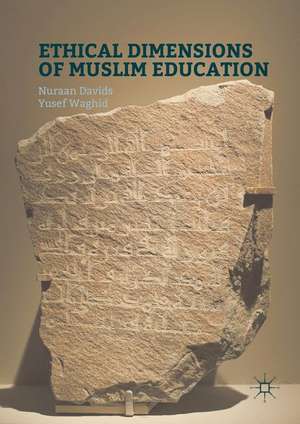Ethical Dimensions of Muslim Education
Autor Nuraan Davids, Yusef Waghiden Limba Engleză Hardback – 8 iul 2016
| Toate formatele și edițiile | Preț | Express |
|---|---|---|
| Paperback (1) | 577.87 lei 6-8 săpt. | |
| Springer International Publishing – 7 iun 2018 | 577.87 lei 6-8 săpt. | |
| Hardback (1) | 581.98 lei 6-8 săpt. | |
| Springer International Publishing – 8 iul 2016 | 581.98 lei 6-8 săpt. |
Preț: 581.98 lei
Preț vechi: 684.68 lei
-15% Nou
Puncte Express: 873
Preț estimativ în valută:
111.36€ • 116.28$ • 91.96£
111.36€ • 116.28$ • 91.96£
Carte tipărită la comandă
Livrare economică 15-29 aprilie
Preluare comenzi: 021 569.72.76
Specificații
ISBN-13: 9783319293165
ISBN-10: 3319293168
Pagini: 159
Ilustrații: XXX, 162 p.
Dimensiuni: 148 x 210 x 15 mm
Greutate: 0.36 kg
Ediția:1st ed. 2016
Editura: Springer International Publishing
Colecția Palgrave Macmillan
Locul publicării:Cham, Switzerland
ISBN-10: 3319293168
Pagini: 159
Ilustrații: XXX, 162 p.
Dimensiuni: 148 x 210 x 15 mm
Greutate: 0.36 kg
Ediția:1st ed. 2016
Editura: Springer International Publishing
Colecția Palgrave Macmillan
Locul publicării:Cham, Switzerland
Cuprins
Preface; Part I: Ethics, Islam and Education.- Chapter 1. Qurānic Conceptual Framework of Ethics.- Chapter 2. The Qurān and the Espousal of Ethics.- Chapter 3. Qurānic Conceptions of being Muslim.- Chapter 4. Qurānic Conceptions of Education.- Part II. Participants in Muslim Education.- Chapter 5. The Qurān and Individual Autonomy.- Chapter 6. Qurānic Conceptions of Community.- Chapter 7. Qurānic Conceptions of being Human.- Chapter 8. Qurānic Conceptions of being Muslim, Mu’min, and Muh’sin.- Part III: Instances of Ethical Dimensions.- Chapter 9. Categories of Human Excellence.- Chapter 10. Relationships among People.- Chapter 11. Social and Societal Conflicts.- Chapter 12. Stereotypes, Marginalisation and Exclusion.
Recenzii
“Ethical Dimensions of Muslim Education has a vital role to play in clearing up confusion around various issues pertaining to Muslim education. The book’s rich analysis of the concepts used in the Islamic texts in relation to education and ethics shows the erudition of the authors. … Ethical Dimensions of Muslim Education is an enlightening book that is much needed in the contemporary sphere of thought.” (Khosrow Bagheri Noaparast, Educational Theory , Vol. 68 (3), 2018)
Notă biografică
Nuraan Davids is a Senior Lecturer in the Department of Education Policy Studs at Stellenbosch University, South Africa. She has previously published Women, Cosmopolitanism and Islamic Education and Citizenship, Education and Violence (with Yusef Waghid).
Yusef Waghid is a Distinguished Professor of Philosophy of Education in the Department of Education Policy Studies at Stellenbosch University, South Africa. He has previously published African Philosophy of Education Reconsidered.
Textul de pe ultima copertă
This book draws upon ethical dimensions of Muslim education as a means through which to address contemporary issues, such as social and societal conflicts, exclusion and marginalisation, and violence. It argues that an ethical Muslim education is underscored by the practice of autonomous, critical and deliberative engagement that can engender reflective judgement, compassionate recognition and a responsible ethical (Muslim) community. Such a community is not only capable of cultivating human relationships based on non-coercion, truthful and peaceful human coexistence, but can also quell the stereotypes and forms of dystopia and exclusion that are pervasive in contemporary society. Put differently, Muslim education extends the neo-Kantian view that ethical human conduct can be rationalised in terms of achieving morally worthwhile action towards forms of engagement that are potentially disruptive.
Nuraan Davids is a Senior Lecturer in the Department of Education Policy Studs at Stellenbosch University, South Africa. She has previously published Women, Cosmopolitanism and Islamic Education and Citizenship, Education and Violence (with Yusef Waghid).
Yusef Waghid is a Distinguished Professor of Philosophy of Education in the Department of Education Policy Studies at Stellenbosch University, South Africa. He has previously published African Philosophy of Education Reconsidered.
Caracteristici
Explores ethical dimensions of Muslim education as a means through which to address contemporary issues Analyses the idea of a Muslim as an ethical being and relates being Muslim to a particular enactment of what it means to be a human Examines the growing climate of Islamophobia as well as misaligned interpretations of the Quran, which suggest Islam is backwards













